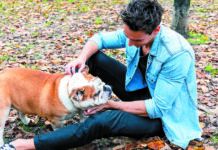Did you know there’s a right way to say good-bye when you depart from your dog? And a right way to say hello when you return? Getting it right is easy. You just have to understand the rationale behind the advice.
Chipper good-byes
Do you make a big deal of saying good-bye to your dog when you’re leaving the house for the day? Or leaving her off at the boarder’s or groomer’s? Do you utter in pained tones that you won’t be gone too long and show her with your eyes that you’re really upset because you understand what she’s about to be put through?
Stop. That behavior sends the clearest message to a dog — even one without separation anxiety — that temporary separations are emotionally painful and that she should feel bad, too. Remember, dogs can’t sequence things the way we do. If there’s nothing wrong and you act like there is, that’s what she will get out of it. She won’t understand that you feel bad about leaving her for a bit and are trying to convey your love for her.
Much better for your pet is a stroke on the side of the muzzle and a chipper “See you later.” That will serve her mood much better in your absence. She will know that being left alone for a while is no big deal.
Heartfelt returns
Save the drama for when you come back to your dog after an absence, even a short one. Your enthusiastic voice combined with touch will make her feel great.
Swedish researchers proved it when they studied a dozen beagles subjected to reunions of various dramatic intensity. After the dogs were left alone for just 25 minutes, their human friends were instructed to return to them in one of three ways: by talking in a friendly voice while petting them, greeting them verbally but not petting them, or entering the room and simply sitting on a chair.
Not only did the dogs treated to the most enthusiastic returns show happy excitement, but blood draws also demonstrated that their levels of the stress hormone cortisol decreased, while their blood concentrations of the “love hormone” oxytocin increased. Oxytocin is produced in greater amounts during moments of positive social connection — birth, breast feeding, and intimate relations.
The hormonal effects were not short lived. Positive changes in hormone levels continued to be evidenced in blood samples drawn later, with the effects remaining longest in those dogs who had been greeted with both verbal and physical affection.
The study is a good reminder of just how much our dogs depend on us for affection — and reassurance. Even talking to your dog when you enter a room where she’s sitting or stroking her as you walk by can lift her mood, as can brushing her or petting her while watching television.





Thank you soooo much for that – I am going to be in Fla. for a couple of months and am taking my dog with me but, unfortunately I have to leave her in a kennel in Fla. for overnight stays. I can take her out through the days but she is not allowed any time in the ‘park’ where I will be. I’ve been stressing out about how all this is going to be completely new to her. Not just the long drive to Fla. but then leaving her in a place where she’s never been before. Being with other dogs through the day or out with me, is great but having to then leave her at night – which I’ve never done before – had me worried. Your article helped a lot. Any other hints would be more than welcomed. Chell Maxwell and Pippin